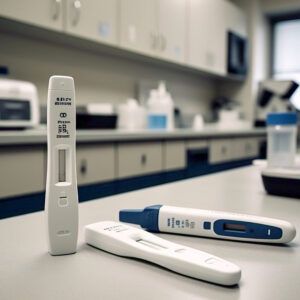- clinic@fpmedicalcenter.com
Introduction
As one expects a baby, a healthy pregnancy is very important. Screening for chromosomal abnormalities and congenital disabilities is an important feature of prenatal diagnosis. With so many tests available, all this becomes baffling for a layman. Two such prevalent tests are the double and triple marker test that serve to determine health concerns for a baby. How different are they? Let us find this out in the article.
What is a Double Marker Test?
The double marker test is a screening available in the first trimester. It diagnoses the risk for chromosomal abnormalities like Down syndrome and Trisomy 18. It is conducted by the doctors between weeks 10-14 of the pregnancy. Low levels of PAPP-A can also detect chromosomal abnormalities.
What is a Triple Marker Test?
The triple marker test done during the second trimester that gives an estimate about chromosomal problems or neural tube defects of the baby. This generally occurs within the 15-20 week periods of the pregnancy by doctors.
The mother’s three essential markers tested via this blood test are:
hCG – Human Chorionic Gonadotropin: a factor capable of causing chromosomal disorders.
AFP (Alpha-Fetoprotein): High levels may indicate neural tube defects.
Estriol: Abnormal amounts may be suggestive of Down syndrome, among others.
Key Difference Between Double and Triple Marker Test
| Feature | Double Marker Test | Triple Marker Test |
|---|---|---|
| Timing | 10–14 weeks (First Trimester) | 15–20 weeks (Second Trimester) |
| Number of Markers | 2 (Free Beta hCG, PAPP-A) | 3 (hCG, AFP, Estriol) |
| Conditions Detected | Down Syndrome, Trisomy 18 | Down Syndrome, Neural Tube Defects, Trisomy 18 |
| Purpose | Early risk assessment for chromosomal abnormalities | Further risk evaluation including neural tube defects |
Which test do doctors recommend ?
It does depend on several factors. First, there is an issue of the mother’s age: more than 35, women carry an increased risk of chromosomal problems. Second, disorders in the family genetics due to medial history may be a call for extended testing. Health of pregnancy-previously acquired complications-may lead to taking both tests. Many doctors advise taking both at different stages to assess comprehensively.
Conclusion
It is good to have a differentiation between double and triple marker test. The chromosomal abnormalities’ test is normally done early during the pregnancy where, when a double marker test is conducted, the broader risk outlined in the results of the triple marker test. It also involves neural tube defects. Consult your doctor to arrive at screening method towards a healthy pregnancy.
Keep up-to-date and travel safely and healthily with your baby!
Quick Contacts
- Phone : +971 50 395 3762
- Email : clinic@fpmedicalcenter.com
- 303, Al Wasl Building, In front of Dubai Mall & Burj Khalifa Metro Station, Dubai
- Country : UAE
- Copyright 2024 - First Priority Medical Center - All Rights Reserved.


Leave a Reply